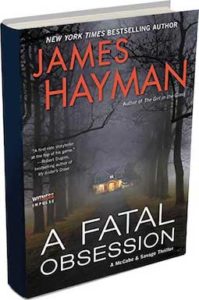Banned Books Week: Censorship is Alive and Well and Living in America
By James Hayman
From September 24th to October 1st the American Library Association, the American Booksellers Association and a number of other like-minded organizations are sponsoring something called Banned Books Week: A Celebration of the Freedom to Read. During that week hundreds of bookstores and libraries around the country will be putting up displays and hosting events to call attention to the continuing problem of censorship in America. As writers and readers I believe we should all support their efforts.
In spite of our supposedly sacrosanct first amendment protections, the tradition of censoring and banning books in America has a long and ignoble history.
In 1873 the US Congress passed the Comstock Act which made it illegal to send obscene materials through the mail. Since publishers used the mail to ship books to booksellers, Comstock and later a number of other state and local statutes, effectively put the kibosh on any printed material deemed by those in power to be obscene. Among the books that were “banned in Boston” were James Joyce’s Ulysses, DH Lawrence’s Lady Chatterly’s Lover and Henry Miller’s Tropic of Cancer.
When I was a teenager attending a New England boarding school, I remember reading a contraband copy of Tropic of Cancer that had been smuggled into my dormitory. The book was passed from room to room where one boy after another breathlessly read Miller’s sexually charged prose, usually after “lights out” and almost always with the aid of a flashlight. I don’t think any of us were permanently damaged by the experience.
While most censorship statutes were eventually struck down by the Supreme Court as infringements on first amendment rights, censorship, most often at the dictate of local school boards, marches on.
It seems extraordinary (and more than a little quaint) to me that today, in the age of Internet, when virtually anything is available to just about anyone’s eyes at the click of a mouse, that schools and libraries around the country are still banning books. And not just pornographic or salacious books either, but genuine classics like Harper Lee’s To Kill a Mockingbird, J.D. Salinger’s Catcher in the Rye, Aldous Huxley’s Brave New World and Toni Morrison’s Beloved among others .
And while these books are at least arguably intended for mature audiences, many children’s classics have not been spared the censor’s steely gaze. Assigning Mark Twain’s Huck Finn as required reading in schools has been controversial for years, (usually because of its use of the so-called N word.) J.K. Rowling’s Harry Potter books, which, as we all know, tell the story of a young wizard and his adventures in wizard school, have been opposed by some who find their focus on wizardry and magic religiously offensive. And Katherine Paterson’s Newbery Award winner Bridge to Terabithia has been challenged as recommended reading by school boards all over the country (including Lincoln, Nebraska, Burlington, Connecticut, Apple Valley, California, Mechanicsburg, PA. and, closer to home, Medway, Maine) because of references to witchcraft and profanity, most notably the use of the phrases like “Oh Lord” and “Lord” as expletives.
To learn more about Banned Books Week, click on the link:

